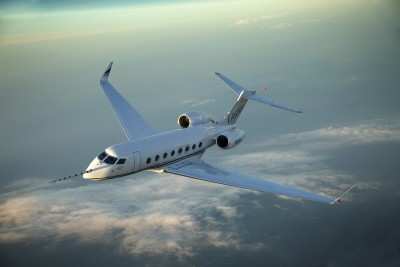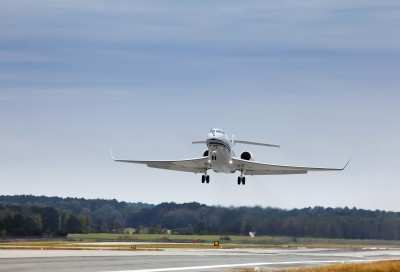Thu, Jan 13, 2011
Gulfstream Says First Flight Ever Using Electrically Powered
Flight-Control System
Gulfstream Aerospace Corp. test pilots and flight-test
engineers recently made business-aviation history when they flew
the Gulfstream G650 flight-test aircraft for the first time using
only an electrically powered, fly-by-wire backup flight-control
actuation system. Gulfstream's Serial Number (S/N) 6001 flew for a
total of 3 hours and 33 minutes on Dec. 21, 2010. Test pilots
Jake Howard and Gary Freeman along with flight-test engineers Bill
Osborne and Nathaniel Rutland evaluated the fly-by-wire system in
electric backup actuation mode for 2 hours and 20 minutes of the
flight, performing five landings with the backup system engaged.
"It flew so well that unless pilots were told they were in backup
actuation mode I don't think they would notice," said test pilot
Freeman.

File Photo
"The system performed flawlessly," said Pres Henne, senior vice
president, Programs, Engineering and Test, Gulfstream. "There was
no difference in handling qualities between the electrically and
hydraulically powered modes."
Typically, fly-by-wire uses a third hydraulic system to provide
redundancy in the event of a dual hydraulic system failure.
However, Gulfstream's fly-by-wire architecture uses electric backup
hydraulic actuators (EBHA): electrically controlled actuators that
are primarily hydraulically powered but offer electric power as a
backup. A self-contained hydraulic reservoir and motor pump allow
full operation should hydraulic loss occur.

The G650 has an EBHA at every primary control surface (elevator,
rudder and aileron) as well as the outboard spoiler. These provide
enhanced safety and aircraft availability because of the two
different power sources. The self-contained actuators also offer an
advantage following extremely rare failure scenarios, such as a
rotor burst.
The Dec. 21 G650 flight began with evaluating the electric
backup-mode handling qualities in one axis and then progressed to
full evaluations in all axes (pitch, roll and yaw). The test
conditions consisted of all flap settings at 10,000 feet for speeds
ranging from 1.13 reference stall speed (VSR) to maximum flap
extended speed (VFE). Cruise configurations were evaluated at
FL280, FL350 and FL450 and the full speed spectrum. The pilots also
initiated an emergency descent profile from FL450 to FL250.
Additionally, they evaluated handling qualities in the landing
configuration by making multiple offset approaches at Brunswick
Golden Isles Airport in Brunswick, Ga.
More News
Aero Linx: International Federation of Airworthiness (IFA) We aim to be the most internationally respected independent authority on the subject of Airworthiness. IFA uniquely combi>[...]
Ultrahigh Frequency (UHF) The frequency band between 300 and 3,000 MHz. The bank of radio frequencies used for military air/ground voice communications. In some instances this may >[...]
A Few Questions AND Answers To Help You Get MORE Out of ANN! 1) I forgot my password. How do I find it? 1) Easy... click here and give us your e-mail address--we'll send it to you >[...]
From 2019 (YouTube Edition): Learning To Paint Without Getting Any On Your Hands PPG's Aerospace Coatings Academy is a tool designed to teach everything one needs to know about all>[...]
Also: Sustainable Aircraft Test Put Aside, More Falcon 9 Ops, Wyoming ANG Rescue, Oreo Cookie Into Orbit Joby Aviation has reason to celebrate, recently completing its first full t>[...]
 ANN's Daily Aero-Linx (05.06.25)
ANN's Daily Aero-Linx (05.06.25) ANN's Daily Aero-Term (05.06.25): Ultrahigh Frequency (UHF)
ANN's Daily Aero-Term (05.06.25): Ultrahigh Frequency (UHF) ANN FAQ: Q&A 101
ANN FAQ: Q&A 101 Classic Aero-TV: Virtual Reality Painting--PPG Leverages Technology for Training
Classic Aero-TV: Virtual Reality Painting--PPG Leverages Technology for Training Airborne 05.02.25: Joby Crewed Milestone, Diamond Club, Canadian Pilot Insurance
Airborne 05.02.25: Joby Crewed Milestone, Diamond Club, Canadian Pilot Insurance




